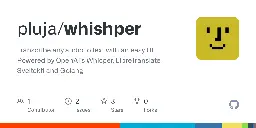AFAIK they had issues with their monero node sync and it has been solved. I had a warning on kycnot.me for this, but I have now just removed it since I just tested and I was able to withdraw and exchange XMR just fine.
Also, for what I know, they had a ddos attack and their site was unresponsive (for what I also put a warning on kycnot.me the moment I became aware of the issue), seems like the attack is over, as the site was responsive when I was testing a few hours ago.
Tailscale does not offer this. It is a community project. Headscale is not official.
I've self-hosted my own single-user Piped instance for about a year. However, I sometimes encounter problems with video loading times, and some subscriptions don't display new publications until I manually visit the channel. The main reason I chose Piped was because it had LibreTube for Android, allowing me to sync my subscriptions between mobile and desktop.
Recently, I've been testing Invidious and I'm liking it. I discovered that using it on Android as a web app is quite efficient, especially in combination with UntrackMe to automatically open YouTube links in my Invidious instance. Additionally, there's Clipious, an Android app similar to LibreTube but with an Invidious backend. Although it's early in its development, it performs well.
I'm still weighing my options, but I find Invidious to be more stable in terms of loading times and subscription feed updates.
There's Clipious for Invidious on Android:
Selfhosted Piped instance. LibreTube with my instance on mobile, the piped web ui for the rest.
When you selfhost an instance, it works way better than any public one with many users.
How would a "pay to download" relay work then? I'm not sure I'm getting how this would solve the issue with Tor?
Isn't a relay with less events (spam) also faster to sync with?
Hey, reach me at SimpleX or by Mail (check on https://kycnot.me/about#contact). I'm no longer using Session for contact. You can also reach me on XMPP if you prefer at kycnotme@conversations.im.

Hey, lately I've been working on a new Nerostr version, with upgraded inner workings and UI, which is now released and ready to be used in production.
Check it out live here: https://xmr.usenostr.org
---
What is this?
For anyone who does not know what Nerostr is, it is an expensive relay for Nostr that is paid with Monero. Since most relays in the nostr space are bitcoin-centric, there was no option to set up a paid relay that accepted monero, so I came up with this project!
Why?
Nostr lacks spam filtering and control, so the option that developers came up with (among others that are work in progress) is what's known as “Pay-to-relay”.
In order to avoid spam in your feed, you pay a small fee (~$1 or less) to a relay. Your pubkey gets whitelisted in that relay, and then you are free to publish events there. Reading from such relays is free for everyone! This allows getting much more curated and clean results in the global page. In short, paid relays are a pretty neat thing for Nostr.
Personally, I was lacking Monero in this equation. Right now, 100% of the Nostr paid relays are being paid in Bitcoin (via LN). For this, I decided I would create a Monero-paid relay so the Monero community starts having a play in Nostr!
What is Nostr?
It is a lightweight, simple yet extensible open protocol that allows building truly censorship resistant and decentralized social media platforms:
- There are two components: events and relays.
- Every user is identified by a public key. Every post is signed. Clients validate these signatures.
- Clients fetch data from relays of their choice and publish data to other relays of their choice. A relay doesn't talk to another relay, only directly to users.
- For example, to "follow" someone, a user instructs their client to query the relays it knows for posts from that public key.
- A "post" can contain any kind of structured data, but the most used ones are going to find their way into the standard so all clients and relays can handle them seamlessly.
You can learn more about Nostr in this site I maintain: https://usenostr.org
---
New version highlights
This new version is a simplified version of the previous project. The main highlights are:
- Uses Strfry as the nostr relay, which is a fast and efficient nostr relay written in C++. The old one used rs-relay.
- Better and fun retro UI (inspired by kyun.host design, which I like a lot)
- 12MB paywall image (vs 50MB paywall image in the old one)
- Only 3 Docker services (vs 6 services in the old one)
- User status check, and expiring invoices.
- Many improvements in the paywall, internal APIs, error handling, etc.
I'm glad you were able to solve the problem, I add the comment I made to another user with the same problem:
Didn't know about this problem. I'll try to add a MariaDB alternative database option soon.
Didn't know about this problem. I'll try to add a MariaDB alternative database option soon to solve this.
Whishper uses faster-whisper in the backend.
Simply put, it is a complete UI for Faster-Whisper with extra features like transcription translation, edition, download options, etc...
Unfortunately, not yet. Whisper per se is not able to do that. Currently, there are few viable solutions for integration, and I'm looking at this one, but all current solutions I know about need GPU for this.
Whisper models have a very good WER (word error ratio) for languages like Spanish, English, French... if you use the english-only models it also improves. Check out this page on the docs:
https://whishper.net/reference/models/#languages-and-accuracy
That's a great idea! I'll attempt to implement that feature when I find some time to work on it.
Whisper+ had some problems, that's why I rewrote everything. This new version should fix almost (maybe there are some bugs I haven't found) everything.
If you take a look at the docker-compose file, you'll see it is already using bind mounts. The only special permission needed is for the LibreTranslate models folder, which runs as non-root with user 1032.
No, it's completely independent, it does not rely on any third-party APIs or anything else. It can function entirely offline once the models have been downloaded.
Transcribe any audio to text with an easy UI. Powered by OpenAI's Whisper, LibreTranslate, Sveltekit and Golang. - GitHub - pluja/whishper: Transcribe any audio to text with an easy UI. Powered...

Hi everyone!
A few days ago I released Whishper, a new version of a project I've been working for about a year now.
It's a self-hosted audio transcription suite, you can transcribe audio to text, generate subtitles, translate subtitles and edit them all from one UI and 100% locally (it even works offline).
I hope you like it, check out the website for self-hosting instructions: https://whishper.net
Correct me if I'm wrong but, I think Brave Ads are opt-in. I have brave installed (although I use Librewolf as my main browser) and I've never seen an ad, you just need to disable them from the settings. Ads are just for those who want to earn BAT (the weird crypto token) by seeing ads.
Yeah, in fact that was the inspiration of the whole rewrite. For this I implemented the point system!
Thank you for your kind words!
Yep, I'm also behind 'awesome-privacy'! You're right, no info can be absolute, but that's not what I'm aiming for. My goal is to gather information in one single place, so anyone can quickly find it and make informed choices based on their own deep dives.
Hi all, I'm pluja maintainer of kycnot.me.
Last month was the 3rd anniversary of kycnot.me! It's amazing that it's been 3 years since the first commit was made. I felt like it deserved a good update on the UI and UX. In the past 3 months, I've been working hard on a complete rewrite of the site. I wanted to give it a decent upgrade for the 3rd anniversary.
If you are interested in the details of the rewrite, take a look at the blog post I wrote. Here are the most important bits of this update:
- New image / UI - I've designed a new logo and color palette for kycnot.me. I think it looks pretty cool and cypherpunk. I'm not a graphic designer, but I think I did a decent work and I put a lot of thinking on how to make it pleasant for the user!
- Point system - The new point system provides more detailed information about the listings, and can be expanded to cover additional features across all services. Anyone can request a new point!
- ToS Scrapper: I've implemented a powerful automated terms-of-service scrapper that collects all the ToS pages from the listings. It saves you from the hassle of reading the ToS by listing the lines that are suspiciously related to KYC/AML practices. This is still in development, and it will improve for sure, but it works pretty fine right now!
- Search bar - The new search bar allows you to easily filter services. It performs a full-text search on the Title, Description, Category, and Tags of all the services. Looking for VPN services? Just search for "vpn"!
- Transparency - To be more transparent, all discussions about services now take place publicly on GitLab. I won't be answering any e-mails (an auto-reply will prompt to write to the corresponding Gitlab issue). This ensures that all service-related matters are publicly accessible and recorded. Additionally, there's a real-time audits page that displays database changes.
- Listing Requests - I have upgraded the request system. The new form allows you to directly request services or points without any extra steps. In the future, I plan to enable requests for specific changes to parts of the website, and even reporting issues with services.
- Lightweight and fast - The new site is lighter and faster than its predecessor!
The new site and all the features that come with it are something I put a lot of hard work into. I'm happy it's finally coming out.
I'd like to settle on a distro, but none of them seem to click for me. I want stability more than anything, but I also value having the latest updates (I know, kind of incompatible).
I have tested Pop!_Os, Arch Linux, Fedora, Mint and Ubuntu. Arch and Pop being the two that I enjoyed the most and seemed the most stable all along... I am somewhat interested in testing NixOS although the learning curve seems a bit steep and it's holding me back a bit.
What are you using as your daily drive? Would you recommend it to another user? Why? Why not?
